The HyperTexts
Famous Confessionals: Poets and Writers
Who were the most famous confessional poets, philosophers and other similar
writers? For my purposes here, I will define a "confessional" as someone who
lays himself/herself bare for public inspection and scrutiny. Please keep in
mind that the opinions expressed here are one man's, and thus subjective.
Honorable Mention: Anne Reeve Aldrich, The Archpoet, Saint Francis of Assisi,
Charles Baudelaire, Saint Bernadette, Anne Bradstreet, Buddha, Robert Burns,
Lord Byron, Leonard Cohen, Samuel Taylor Coleridge, Sam Cooke, e. e. cummings,
King David, Bob Dylan, Emily Dickinson, Ernest Dowson, Robert Frost, Gandhi, A.
E. Housman, Langston Hughes, Janis Ian, Michael Jackson, James Joyce, Jonah,
Franz Kafka, John Keats, Helen Keller, John Lennon, Martin Luther, Madonna,
Marilyn Monroe, Friedrich Nietzsche, Origen, Wilfred Owen, Plato, Saint Paul,
Edgar Allan Poe, Arthur Rimbaud, Christina Rossetti, Dante Gabriel Rossetti,
Anne Sexton, William Shakespeare, Percy Bysshe Shelley, Sarah Silverman, Paul
Simon, Socrates, Dylan Thomas, Mark Twain, Paul Verlaine, Renee Vivien, Virginia Woolf,
William Wordsworth, Sir Thomas Wyatt, William Butler Yeats
(#10) John Berryman and W. D. Snodgrass (tie)
(#9) Anne Sexton
(#8) Oscar Wilde and Dorothy Parker (tie)
(#7) Edna St. Vincent Millay: She was equally unsparing with herself and her
lovers.
(#6) Robert Lowell: He was a teacher and mentor to Plath and Sexton.
(#5) Michel de Montaigne: The great essayist frequently assayed himself.
(#4) Sylvia Plath: The golden child of poetry was not a happy camper.
(#3) Emily Dickinson: The famous recluse was anything but shy in her poems.
(#2) Walt Whitman: Leaves of Grass was unlike anything written before,
or since.
(#1) Sappho of Lesbos: The original confessional poet remains one of the very
best.
Sappho of Lesbos
Gleyre Le Coucher de Sappho
by Marc-Charles-Gabriel Gleyre
Sappho of Lesbos is perhaps the first great female poet still known to us today,
and she remains one of the very best poets of all time, regardless of gender.
She is so notorious that we get our terms "sapphic" and "lesbian" from her name
and island of residence. As you can see from the two utterly stellar epigrams
below, she remains a timeless treasure:
Sappho, fragment 42
loose translation by Michael R. Burch
Eros harrows my heart:
a wind on desolate mountains
uprooting oaks.
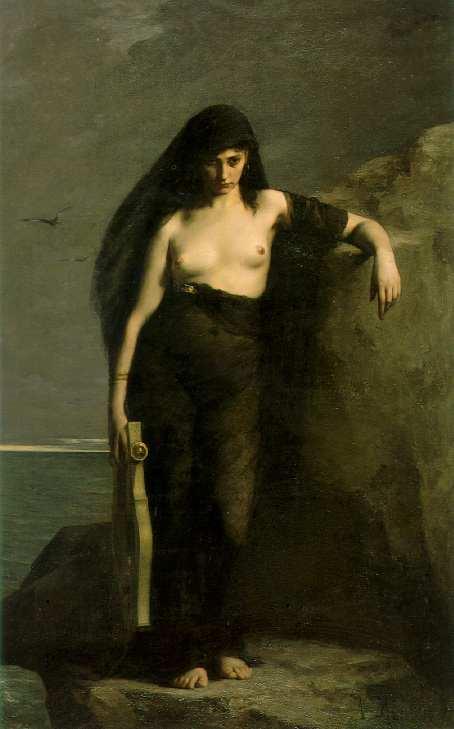
Artistic rendering of Sappho by William Adolphe Bouguereau
Sappho, fragment 155
loose translation by Michael R. Burch
A short transparent frock?
It's just my luck
your lips were made to mock!
It is dangerous to be right in matters on which the established authorities
are wrong. ― Voltaire
The Divine Oscar Wilde
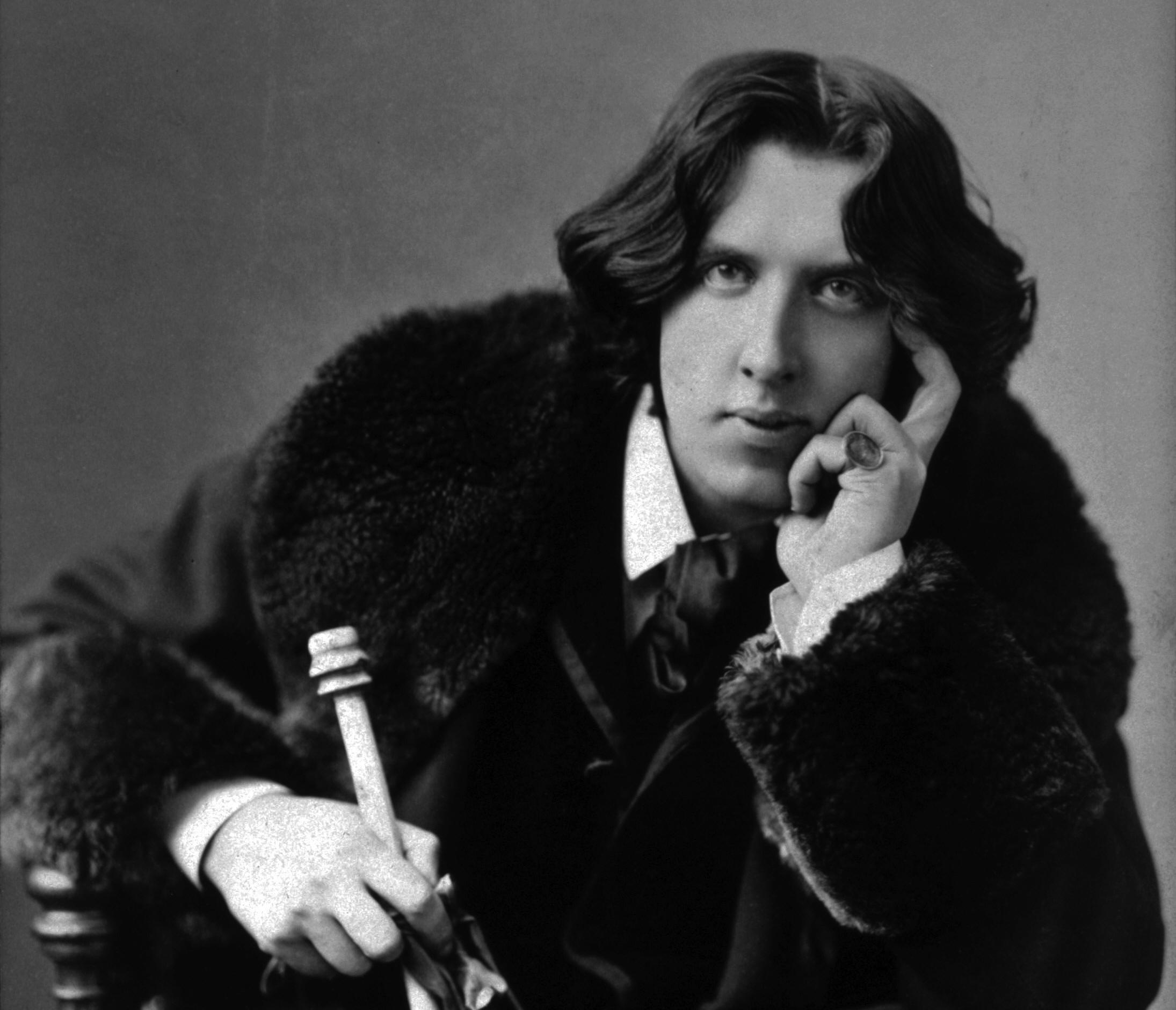
Oscar Wilde may be the most notorious "bad boy" in the annals of poetry and
literature. He was flamboyantly gay
at a time when polite society was prim, proper and violently homophobic. As a
result, he was sentenced to
hard labor at Reading Gaol and died soon after his release. Wilde is justly famous
today for his disdain for "respectability" and dull and dulling conformity, as his witty epigrams
prove:
Scandal is gossip made tedious by morality.
I can resist everything except temptation.
I believe God in creating Man somewhat overestimated his ability.
Whenever a man does a thoroughly stupid thing, it is always from the noblest motives.
There is no sin except stupidity.
Every saint has a past and every sinner has a future.
We are all in the gutter, but some of us are looking at the stars.
"Heresy," by the way, simply means "choice." It came to
mean "thought crime," implying it was blasphemy to presume to choose your own
belief instead of swallowing what the bishops spoonfed you. ― Robert M. Price
Dorothy Parker, Wild as Wilde?
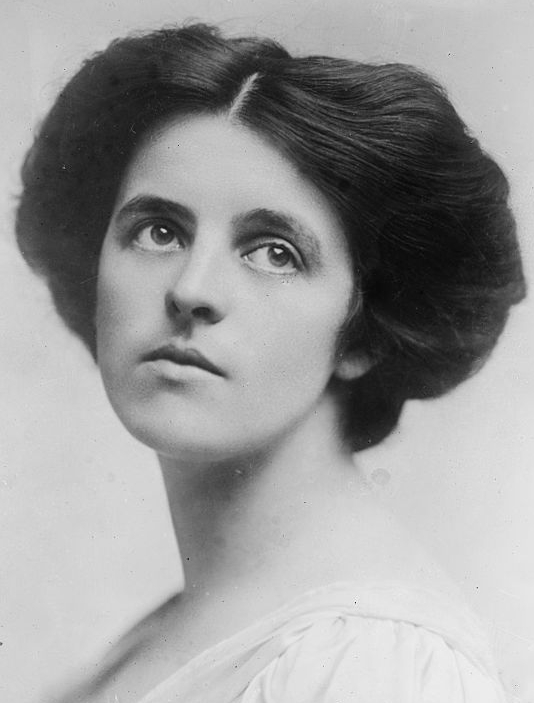
Dorothy Parker was perhaps Oscar Wilde's female double, or at the very least his
kindred spirit. Like Wilde, she left us a trove of witty epigrams:
That woman speaks eight languages and can't say "no" in any of them.
If all the girls who attended the Yale prom were laid end to end, I wouldn't be a bit surprised.
If you want to know what God thinks of money, just look at the people he gave it to.
One century's saint is the next century's heretic ... and one century's
heretic is the next century's saint. It is as well to think long and calmly
before affixing either name to any man. ― Ellis Peters
Sylvia Plath
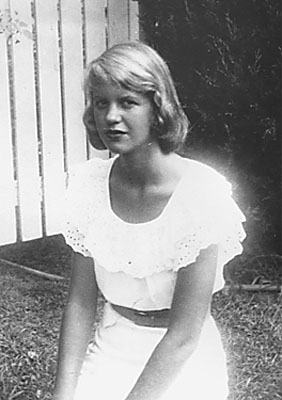
Sylvia Plath was one of the first and best of the modern confessional poets. She
won a Pulitzer Prize posthumously for her Collected Poems after
committing suicide at the age of 31, something she seemed to have been
predicting in her writing and practicing for in real life. For instance, in 1950
as a college student she had slashed her legs to see if she had the courage to
commit suicide, after failing to meet the great Welsh poet Dylan Thomas as she
had hoped. (Many of the events that took place around that time would later be
used as inspiration for her semi-autobiographical novel The Bell Jar.)
A few years later she attempted suicide for the first time by crawling under her
house and taking her mother's sleeping pills. She spent three days in the crawl
space, thinking the blackness she experienced was "eternal oblivion." She
eventually ended her life on February 11, 1963, by sticking her head in an oven
and turning on the gas. After her death, women in the feminist movement
came to see Plath as a voice speaking for them. Honor Moore
opined: "When Sylvia Plath’s Ariel was published in the United States
in 1966, American women noticed. Not only women who ordinarily read poems, but
housewives and mothers whose ambitions had awakened ... Here was a woman,
superbly trained in her craft, whose final poems uncompromisingly charted female
rage, ambivalence, and grief, in a voice with which many women identified."
Edge
The woman is perfected.
Her dead
Body wears the smile of accomplishment,
The illusion of a Greek necessity
Flows in the scrolls of her toga,
Her bare
Feet seem to be saying:
We have come so far, it is over.
Each dead child coiled, a white serpent,
One at each little
Pitcher of milk, now empty.
She has folded
Them back into her body, as petals
Of a rose close when the garden
Stiffens and odors bleed
From the sweet, deep throats of the night flower.
The moon has nothing to be sad about,
Staring from her hood of bone.
She is used to this sort of thing.
Her blacks crackle and drag.
It is strange the way that someone who wants to find
you guilty can start to make you believe in your own guilt, even when you know
you are innocent. ― S. J. Parris
Anne Sexton
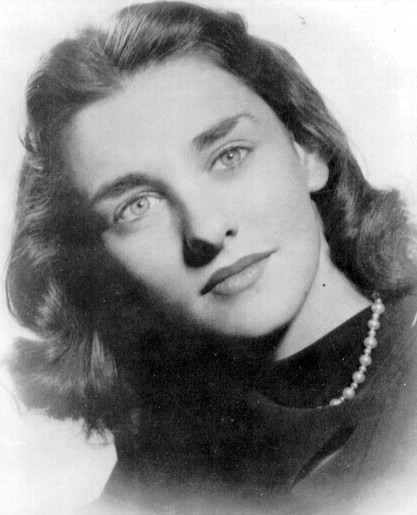
Anne Sexton was a model who became a confessional
poet, writing about intimate aspects of her life, after her doctor suggested
that she take up poetry as a form of therapy. She studied under Robert Lowell at
Boston University, where Sylvia Plath was one of her classmates. Sexton won the
Pulitzer Prize for Poetry in 1967, but later committed suicide via carbon
monoxide poisoning. Topics she covered in her poems included adultery,
masturbation, menstruation, abortion, despair and suicide.
The Truth the Dead Know
by Anne Sexton
For my Mother, born March 1902, died March 1959
and my Father, born February 1900, died June 1959
Gone, I say and walk from church,
refusing the stiff procession to the grave,
letting the dead ride alone in the hearse.
It is June. I am tired of being brave.
We drive to the Cape. I cultivate
myself where the sun gutters from the sky,
where the sea swings in like an iron gate
and we touch. In another country people die.
My darling, the wind falls in like stones
from the whitehearted water and when we touch
we enter touch entirely. No one's alone.
Men kill for this, or for as much.
And what of the dead? They lie without shoes
in the stone boats. They are more like stone
than the sea would be if it stopped. They refuse
to be blessed, throat, eye and knucklebone.
Clergy had a vested interest in retaining the old
ways, which made few demands of them as teachers, as spiritual guides, or as
moral examples or agents. ― Alister E. McGrath
Heresy kicks ass. ― P.S. Baber
William Butler Yeats and Maud Gonne
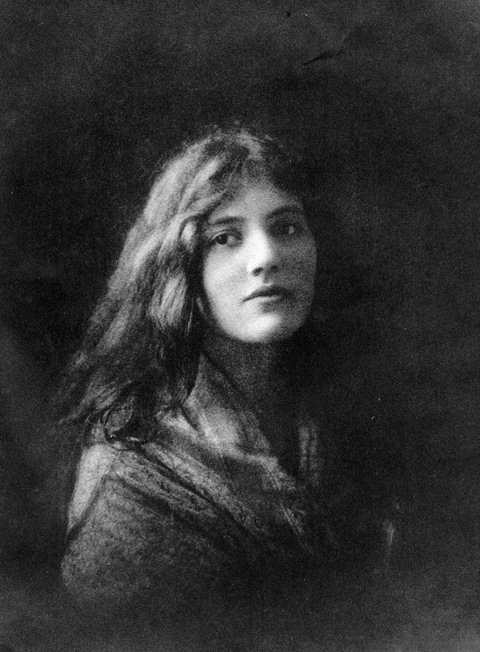
William Butler Yeats was the most famous Irish poet of all time, and his
unrequited love for Maud Gonne helped make her almost as famous as he was in
Ireland. Yeats dabbled in the occult, automatic writing, séances,
mysticism, spiritualism, hermeticism and astrology. When he
was admitted into the Golden Dawn, he took the magical motto
Daemon est Deus inversus—"Devil is God inverted." The moving poem
below is Yeats' loose translation of a Ronsard poem, in which Yeats imagines the
love of his life in her later years tending a fire.
When You Are Old
by William Butler Yeats
When you are old and grey and full of sleep,
And nodding by the fire, take down this book,
And slowly read, and dream of the soft look
Your eyes had once, and of their shadows deep;
How many loved your moments of glad grace,
And loved your beauty with love false or true,
But one man loved the pilgrim soul in you,
And loved the sorrows of your changing face;
And bending down beside the glowing bars,
Murmur, a little sadly, how Love fled
And paced upon the mountains overhead
And hid his face amid a crowd of stars.
All right, so you believe in Santa Claus, and I'll
believe in the Great Pumpkin. The way I see it, it doesn't matter what you
believe, just so you're sincere! (Linus) ― Charles M. Schulz
Edna St. Vincent Millay
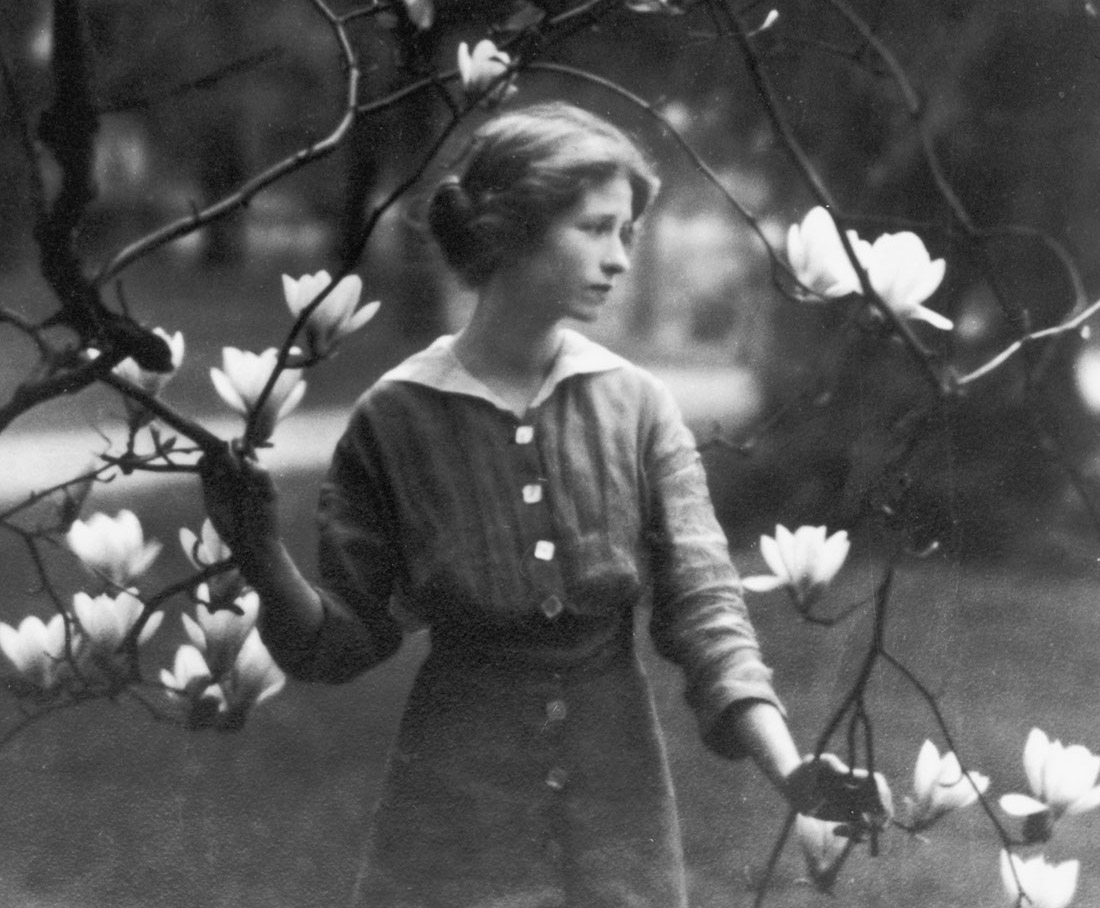
Edna St. Vincent Millay was the first woman to win a Pulitzer Prize for poetry.
She was openly bisexual and had affairs with other women and married men. When
she finally married, hers was an open marriage. Her 1920 poetry collection A
Few Figs From Thistles drew controversy for its novel exploration of female
sexuality. She was one of the earliest and strongest voices for what became
known as feminism. One of the recurring themes of her poetry was that men might
use her body, but not possess her or have any claim over her. (And perhaps that
their desire for her body gave her the upper hand in relationships.)
I, Being Born a Woman, and Distressed
by Edna St. Vincent
Millay
I, being born a woman, and distressed
By all the needs and notions of my kind,
Am urged by your propinquity to find
Your person fair, and feel a certain zest
To bear your body's weight upon my breast:
So subtly is the fume of life designed,
To clarify the pulse and cloud the mind,
And leave me once again undone, possessed.
Think not for this, however, this poor treason
Of my stout blood against my staggering brain,
I shall remember you with love, or season
My scorn with pity — let me make it plain:
I find this frenzy insufficient reason
For conversation when we meet again.
I believe that, in the end, even the devils will be pardoned. ― S.J. Parris
Anne Bradstreet
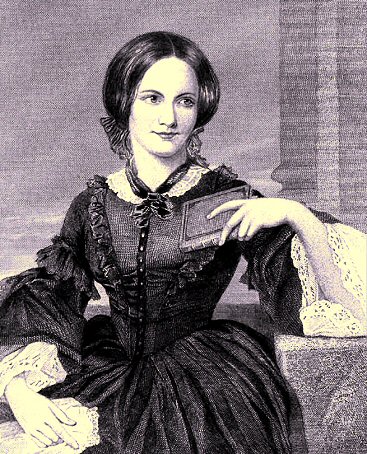
Anne Dudley Bradstreet was America's first published poet, called the "tenth
Muse," and a free thinker and early feminist. In her poem "The Prologue, she
pointed out how the chauvinistic society of her day
unfairly criticized women's accomplishments:
I am obnoxious to each carping tongue
Who says my hand a needle better fits,
A poet's pen all scorn I should thus wrong.
For such despite they cast on female wits:
If what I do prove well, it won't advance,
They'll say it's stol'n, or else it was by chance.
This authority stood steady as the cathedral itself.
The building was raised once and for all, and for those who dare doubt it,
something else was raised: The witch fires. ― André Bjerke
Dylan Thomas
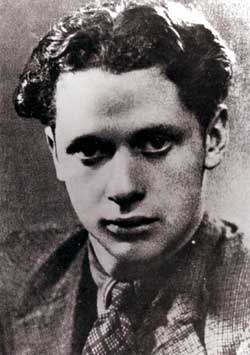
Dylan Thomas died after a multi-day drinking binge in which he was quoted as
saying, "I've had 18 straight whiskies. I think that's the record!" Thomas was
admitted to the emergency ward at St Vincent's Hospital in a comatose state, and
his medical notes state that the "impression upon admission was acute alcoholic
encephalopathy damage to the brain by alcohol, for which the patient was treated
without response". His wife Caitlin flew to America the next day and was taken
to the hospital. Her first reported words were, "Is the bloody man dead yet?"
Later, in a drunken rage, she threatened to kill another poet, John Brinnin.
When she became uncontrollable, she was put in a straight-jacket and committed
to the River Crest private psychiatric detox clinic on Long Island.
Do Not Go Gentle Into That Good Night
by Dylan Thomas
Do not go gentle into that good night,
Old age should burn and rave at close of day;
Rage, rage against the dying of the light.
Though wise men at their end know dark is right,
Because their words had forked no lightning they
Do not go gentle into that good night.
Good men, the last wave by, crying how bright
Their frail deeds might have danced in a green bay,
Rage, rage against the dying of the light.
Wild men who caught and sang the sun in flight,
And learn, too late, they grieved it on its way,
Do not go gentle into that good night.
Grave men, near death, who see with blinding sight
Blind eyes could blaze like meteors and be gay,
Rage, rage against the dying of the light.
And you, my father, there on the sad height,
Curse, bless, me now with your fierce tears, I pray.
Do not go gentle into that good night.
Rage, rage against the dying of the light.
The faith a movement proclaims doesn't count: what
counts is the hope it offers. All heresies are the banner of a reality, an
exclusion. Scratch the heresy and you will find the leper. Every battle against
heresy wants only this: to keep the leper as he is. ― Umberto Eco
Lord Byron
George Gordon, Lord Byron, was one of the most notorious
poets of all time. While Byron is justly famous for his poetry, he is perhaps
even more infamous for his many love affairs, including a possibly incestuous
one with his half-sister, Augusta Leigh, and homosexual ones
with fellow students at Harrow and Cambridge. His mother once wrote that her son
"has no indisposition that I know of but love, desperate love, the worst of all
maladies in my opinion." He was renowned for his personal beauty, which he
enhanced by wearing curl-papers in his hair at night. Plagued by scandalous
rumors of incest, sodomy, adultery with actresses and marital violence, Byron
eventually left England, never to return. After his death, some of his
friends burned his autobiography, perhaps considering it too
notorious to be read by polite society.
So We'll Go No More A-Roving
So we'll go no more a-roving
So late into the night,
Though the heart be still as loving,
And the moon be still as bright.
For the sword outwears its sheath,
And the soul outwears the breast,
And the heart must pause to breathe,
And love itself have rest.
Though the night was made for loving,
And the day returns too soon,
Yet we'll go no more a-roving
By the light of the moon.
Perchance you who pronounce my sentence are in greater
fear than I who receive it. ― Giordano Bruno, burned at the stake for
pointing out the the earth's sun is one star among many
Percy Bysshe Shelley and Mary Wollstonecraft Shelley
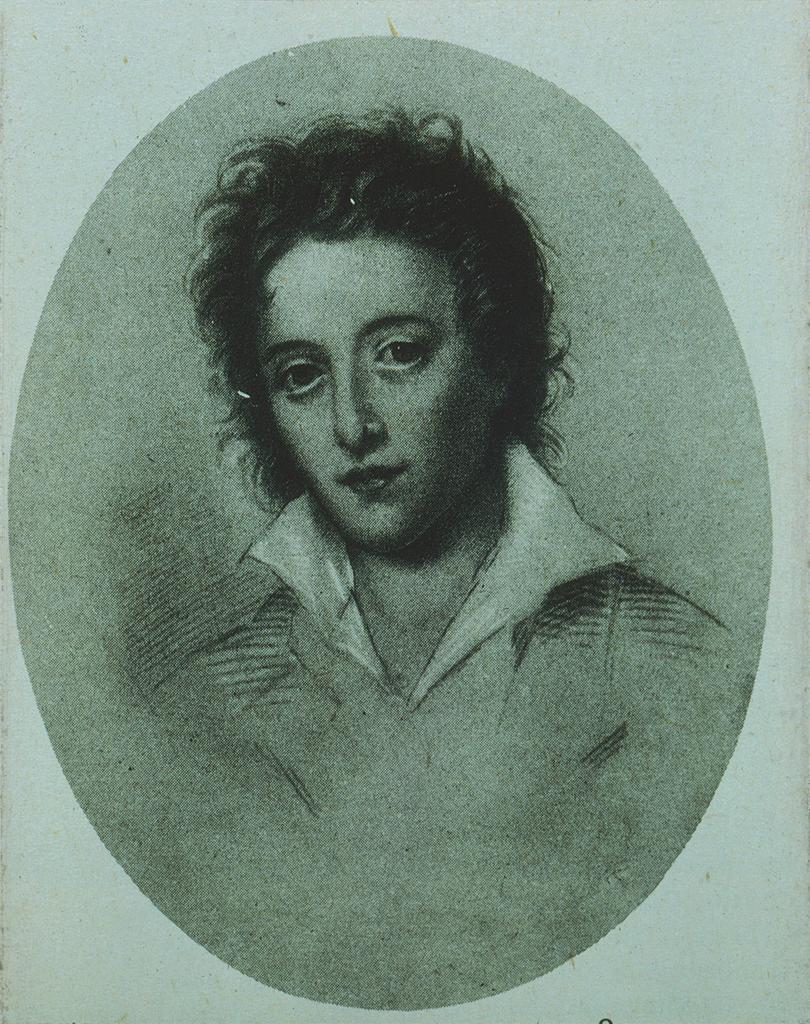
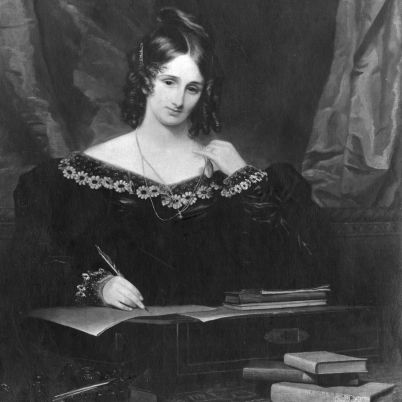
Percy Bysshe Shelley and Mary Wollstonecraft Shelley may have been the most notorious married
couple of their era. He was a dashing romantic poet and heretic who wrote a
tract, "The Necessity of Atheism," that got him expelled from Oxford. He also
wrote in favor of nonviolence and against monarchies,
imperialism and war. She was the daughter of one of the earliest feminist
writers of note, Mary Wollstonecraft, and the liberal philosopher William
Godwin. Her parents had, for their day, a rather
shocking marriage, with multiple affairs and an illegitimate child born to her
mother. Thus the young Mary Wollstonecraft Godwin may have grown up with
unconventional ideas about sex and marriage. In 1814, at age seventeen, she
became romantically involved with Percy Shelley, who was married at the time but
threatened to commit suicide if she spurned his advances. They spent time
together in France and Switzerland; when they returned, Mary was pregnant. Percy's wife Harriet, who was also pregnant, committed suicide in 1816; Percy
and Mary married soon thereafter. The same year they spent the summer with Lord
Byron. It was at this time that Mary conceived the story that became her famous
gothic novel Frankenstein. In 1918 a baby girl, Elena Adelaide Shelley,
was born and registered in Italy as the daughter of Percy and a woman named
"Marina Padurin." However, the real identity of the mother remains an unsolved
mystery. In 1822, Percy drowned at sea at age thirty. Who knows what he would
have accomplished if he had lived longer, but he is still considered to be one
of the greatest English poets. Here is one especially lovely example of his
wonderful touch with rhythm and rhyme:
Music When Soft Voices Die (To
—)
Music, when soft voices die,
Vibrates in the memory—
Odours, when sweet violets sicken,
Live within the sense they quicken.
Rose leaves, when the rose is dead,
Are heaped for the belovèd's bed;
And so thy thoughts, when thou art gone,
Love itself shall slumber on.
Did he [Jesus] not mock at the sabbath, and so
mock the sabbath's God? murder those who were murder'd because of him? turn away
the law from the woman taken in adultery? steal the labor of others to support
him? bear false witness when he omitted making a defense before Pilate? covet
when he pray'd for his disciples, and when he bid them shake off the dust of
their feet against such as refused to lodge them? I tell you, no virtue can
exist without breaking these ten commandments; Jesus was all virtue, and acted
from impulse, not from rules. ― William Blake
Dante Gabriel Rossetti and Elizabeth Siddal
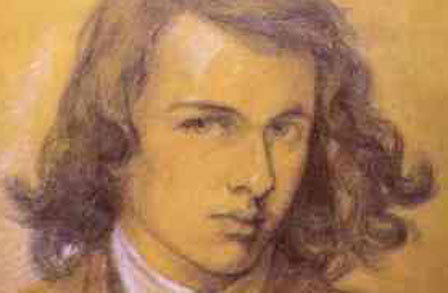
Self-Portrait, 1847
Dante Gabriel Rossetti was an English romantic poet, painter, illustrator and
translator. He was also one of the founders of the Pre-Raphaelite Brotherhood. His
art was characterized by sensuality and medieval revivalism. He frequently wrote
sonnets to accompany his works of visual art. In 1850 he met Elizabeth Siddal
(pictured below), who became his model, his passion, and eventually in 1860, his
wife. But around the time of his marriage, he began to paint a new model, his
new lover, Fanny Cornforth.
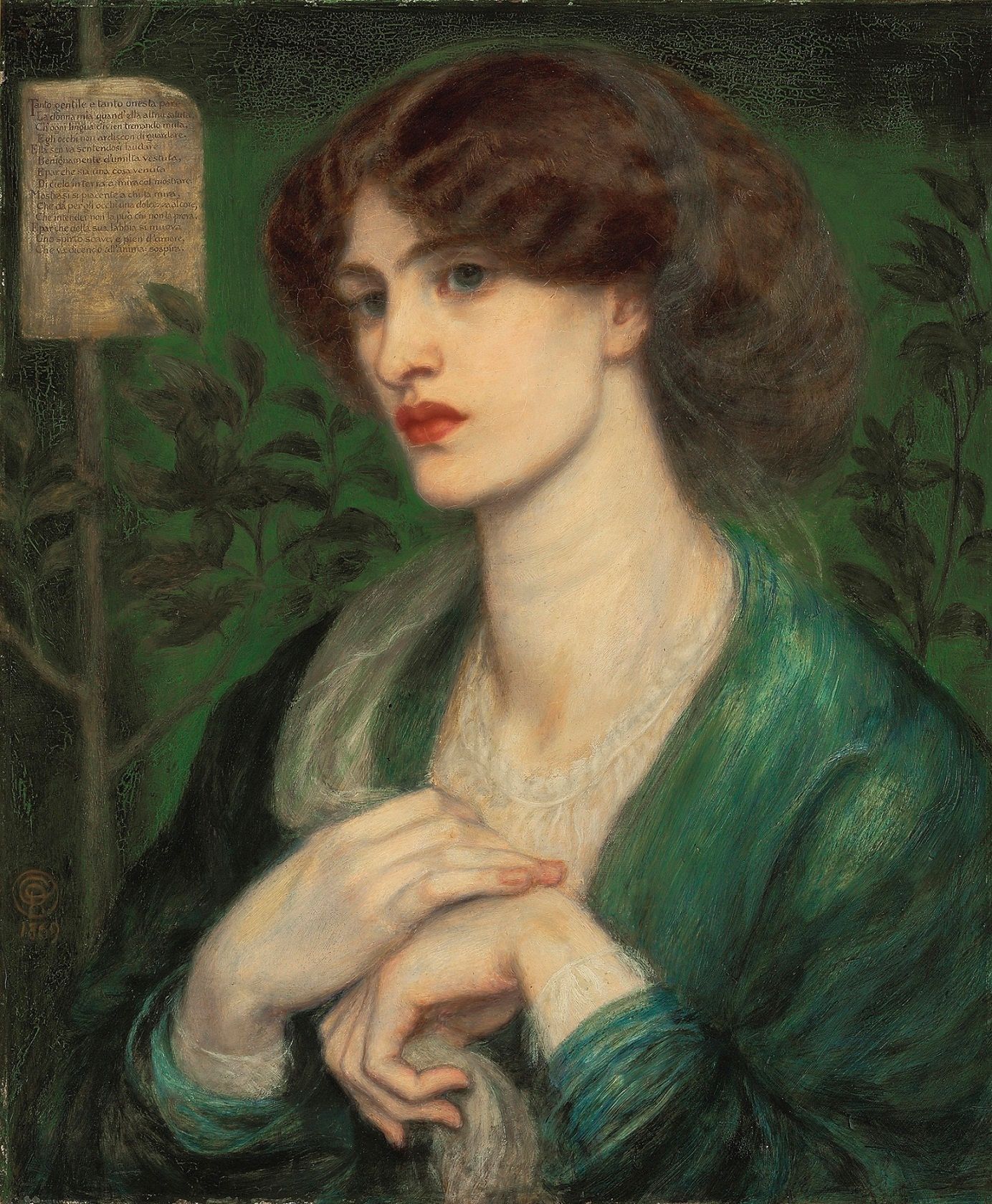
Elizabeth Siddal died of an overdose of laudanum in 1862, shortly after giving
birth to a stillborn child. Rossetti buried the bulk of his unpublished poems
with her at Highgate Cemetery, but he later had them dug up. He idealized her as
Dante's Beatrice in a number of paintings, such as Beata Beatrix (below).
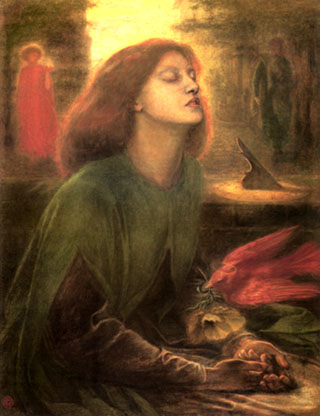
After his wife's death, Rossetti leased a house in Chelsea where he lived amid
extravagant furnishings and a parade of exotic birds and animals. He owned a pet
wombat named "Top" who was brought to the dinner table and allowed to sleep in
the large centerpiece during meals. He also owned a llama and a toucan. The
toucan was dressed in a cowboy hat and rode the llama around the dining table
for his amusement.
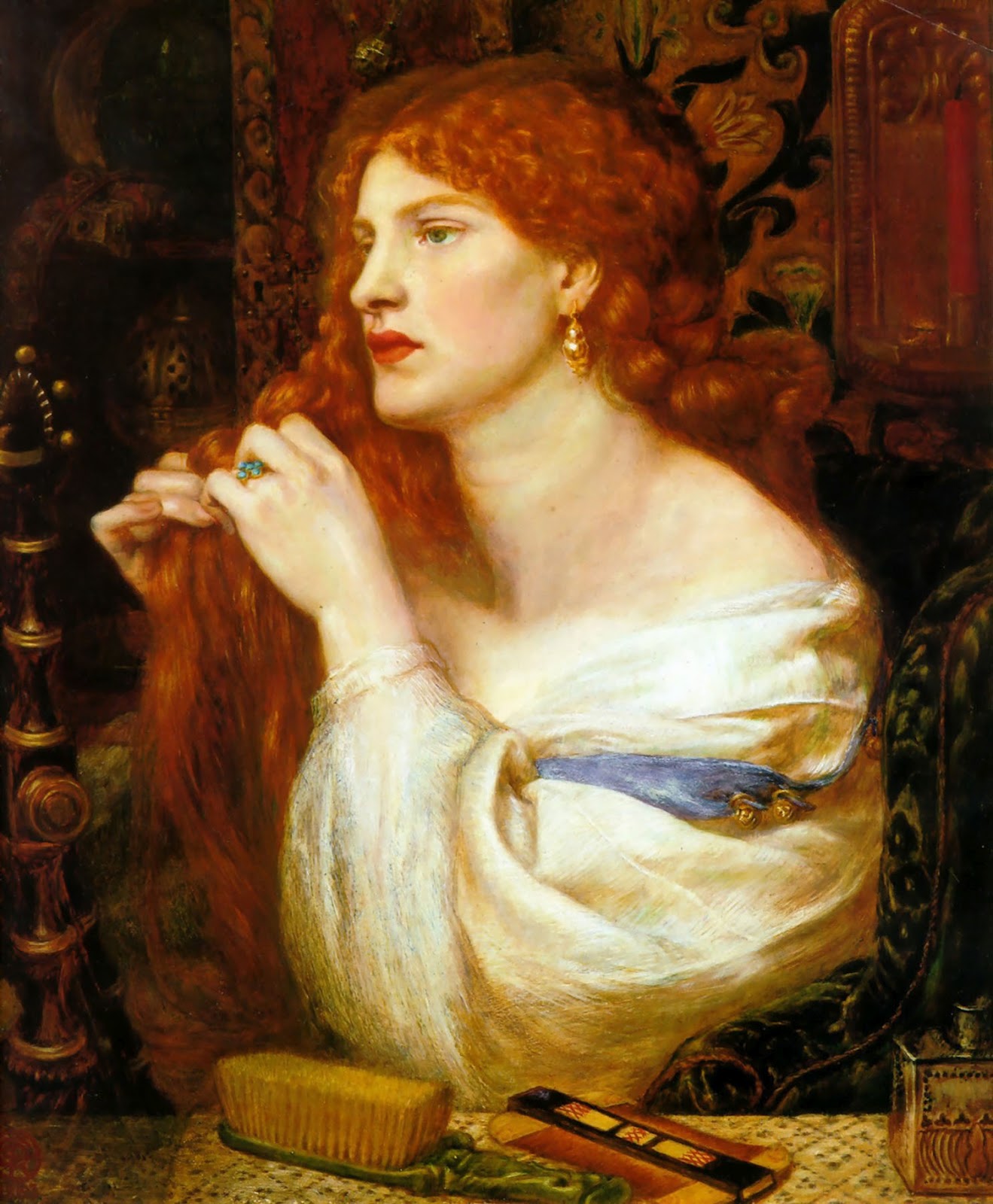
After Rossetti exhumed his poems from his wife's grave they were published in
1870. The poems were attacked as the epitome of the "fleshly school of poetry"
due to their eroticism and sensuality. The savage reaction of critics to
Rossetti's first collection of poetry contributed to a mental breakdown he
suffered in 1872, and he "spent his days in a haze of chloral and whisky". He
recovered enough to create a soulful series of dream-like portraits of his
favored models Alexa Wilding and Jane Morris. But toward the end of his life, he
sank into a morbid state, darkened by his drug addiction to chloral hydrate and
increasing mental instability. He spent his last years as a recluse.
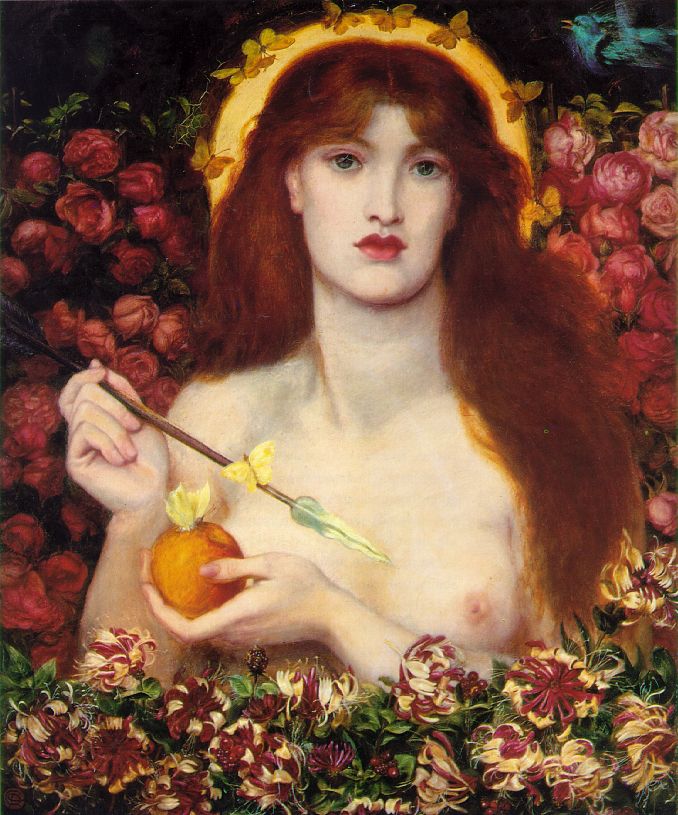
Christina Rossetti
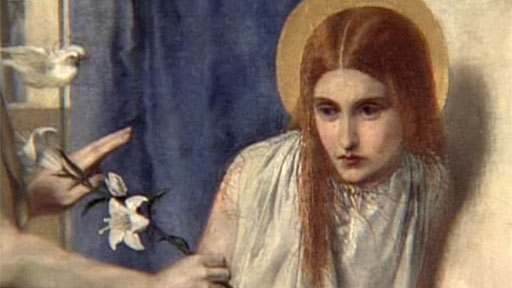
Christina Rossetti was the sister of Dante Gabriel Rossetti, and perhaps the
better poet.
Song
by Christina Rossetti
When I am dead, my dearest,
Sing no sad songs for me;
Plant thou no roses at my head,
Nor shady cypress tree:
Be the green grass above me
With showers and dewdrops wet;
And if thou wilt, remember,
And if thou wilt, forget.
I shall not see the shadows,
I shall not feel the rain;
I shall not hear the nightingale
Sing on, as if in pain:
And dreaming through the twilight
That doth not rise nor set,
Haply I may remember,
And haply may forget.
I may err but I am not a heretic, for the first has to
do with the mind and the second with the will! ― Meister Eckhart
Arthur Rimbaud and Paul Verlaine
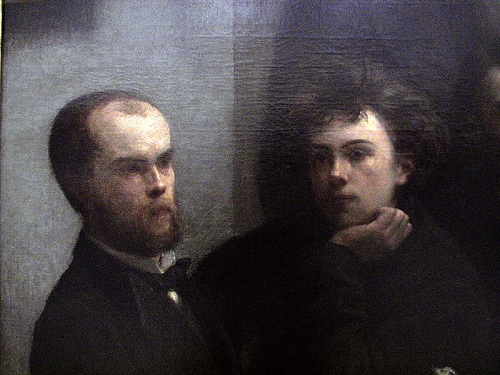
Arthur Rimbaud (on the right above and below) and Paul Verlaine (on the left
above) were French poets. Rimbaud was a child prodigy; he showed maturity as a
poet at age fifteen and is considered one of the greatest French poets even
though he stopped writing poetry by age twenty. When Rimbaud was seventeen, he
met Paul Verlaine and they began a torrid affair, even though Verlaine was
married and his wife, also seventeen, was pregnant. Together the two poets led a
wild, vagabond-like existence, indulging in sex, absinthe and hashish. Verlaine
abandoned his wife and infant son, both of whom he had abused in alcoholic rages.
But the poets' relationship also became increasingly violent. Finally, in a drunken rage,
Verlaine shot Rimbaud, wounding his left wrist. At first Rimbaud refused to
press charges, but when he felt that Verlaine's behavior was becoming bizarre to
the point of insanity, he begged a police officer to arrest his former lover.
Verlaine was subsequently sentenced to two years in prison. By age twenty
Rimbaud had given up poetry to become a soldier, deserter, stone quarry foreman,
gunrunner and slave trader, among other occupations. He died at age 37 shortly
after having his right leg amputated. After the shooting, Verlaine became a
convert to Catholicism and a school teacher. He died at age 51 of complications
from his drug abuse and alcoholism.
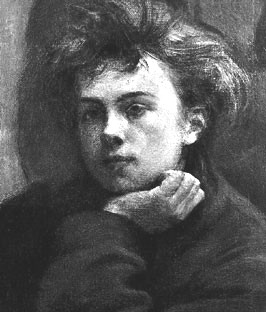
Here's a poem written by Rimbaud, at the age of sixteen or earlier:
Sensation
On the blue summer evenings, I shall go down the paths,
Getting pricked by the corn, crushing the short grass:
In a dream I shall feel its coolness on my feet.
I shall let the wind bathe my bare head.
I shall not speak, I shall think about nothing:
But endless love will mount in my soul;
And I shall travel far, very far, like a gipsy,
Through the countryside—as happy as if I were with a woman.
Sir Thomas Wyatt and Anne Boleyn


Sir Thomas Wyatt has been credited with introducing the
Petrarchan sonnet into the English language. His father, Henry Wyatt, had been one of Henry
VII's Privy Councilors, and remained a trusted adviser when Henry VIII came to
the throne in 1509. Thomas Wyatt followed his father to court. But it seems the
young poet may have fallen in love with the king’s mistress. Many legends and
conjectures suggest that an unhappily married Wyatt had a relationship with
Anne Boleyn. Their acquaintance is certain, but whether or not the two
actually shared a romantic relationship remains unknown. But in his poetry, Wyatt called
his mistress Anna, and sometimes embedded pieces of information that seem to correspond with
her life. For instance, this poem might well have been written
about the King’s claim on Anne Boleyn:
Whoso List to Hunt
Whoso list to hunt, I know where is an hind,
But as for me, alas, I may no more.
The vain travail hath wearied me so sore,
I am of them that farthest cometh behind.
Yet may I by no means my wearied mind
Draw from the deer, but as she fleeth afore
Fainting I follow. I leave off therefore,
Since in a net I seek to hold the wind.
Who list her hunt, I put him out of doubt,
As well as I may spend his time in vain.
And graven with diamonds in letters plain
There is written, her fair neck round about:
Noli me tangere, for Caesar's I am,
And wild for to hold, though I seem tame.
Noli me tangere means "Touch me not." According to the Bible, this is
what Jesus said to Mary Magdalene when she tried to embrace him after the
resurrection.
In May 1536, Wyatt was imprisoned in the Tower of London for allegedly
committing adultery with Anne Boleyn. He was released from the Tower later that
year, thanks to his friendship and his father's friendship with Thomas Cromwell. But during his stay in the Tower,
Wyatt may have
witnessed the execution of Anne Boleyn from his cell window, and the
executions of the five other men with whom she was accused of committing
adultery.
Virginia Woolf
Adeline Virginia Woolf was one of the leading early twentieth century modernists
and feminists. She was sexually abused by her half-brothers, had several nervous
breakdowns, and was institutionalized for a period of time, before finally
committing suicide by filling her pockets with stones and walking into the River
Ouse, where she drowned. She was bisexual or at least tentatively explored
lesbian sex with the writer Vita Sackville-West. In her novel Orlando
the titular hero shifts gender. She also denounced Christianity and at times
seemed to border on anti-Semitism in her writing despite being married to a "penniless Jew."
For most of history, Anonymous was a woman.
Each has his past shut in him like the leaves of a book known to him by heart, and his friends can only read the title.
One has to secrete a jelly in which to slip quotations down people's throats,
and one always secretes too much jelly.
Yet, it is true, poetry is delicious; the best prose is that which is most
full of poetry.
I want the concentration and the romance, and the worlds all glued together,
fused, glowing: have no time to waste any more on prose.
The history of men's opposition to women's emancipation is more interesting
perhaps than the story of that emancipation itself.
This is an important book, the critic assumes, because it deals with war.
This is an insignificant book because it deals with the feelings of women in a
drawing-room.
Life is not a series of gig lamps symmetrically arranged; life
is a luminous halo, a semi-transparent envelope surrounding us from the
beginning of consciousness to the end.
Renée Vivien
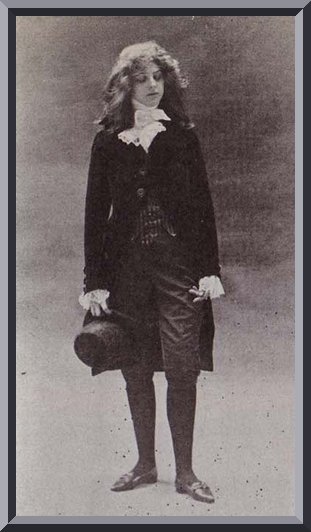
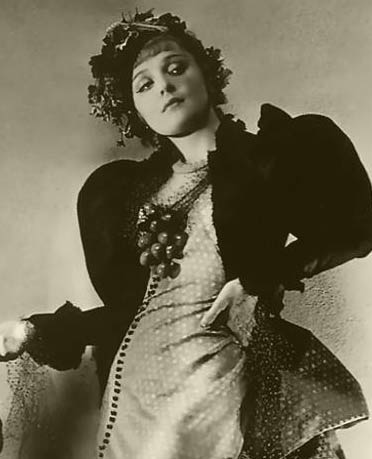
Renée Vivien (1877-1909) was a
British poet who wrote primarily in French. She was one of the last major poets
of Symbolism. Her work included sonnets, hendecasyllabic verse and prose poetry.
Born
Pauline Mary Tarn in London to a British father and American mother, she grew up in Paris and London. Upon inheriting her father's fortune at age 21,
she emigrated permanently to France. In Paris, her dress and lifestyle were as
notorious as her verse. She lived lavishly as an open lesbian, sometimes
dressing in men's clothes, while harboring a
lifelong obsession for her closest childhood friend, Violet Shillito (a
relationship that apparently remained unconsummated). Her obsession with violets
led to Vivien being called the "Muse of the Violets." But in 1900 Vivien abandoned
this chaste love to engage in a public affair with the American writer and
heiress Natalie Clifford Barney. The following year Shillito died of typhoid
fever, a tragedy from which Vivien never fully recovered. Vivien later had a
relationship with a baroness to whom she considered herself to be married, even
though the baroness had a husband and children. During her adventurous life,
Vivien indulged in alcohol, drugs, fetishes and sadomasochism. But she grew
increasingly frail and by the time of her death she weighed only 70 pounds,
quite possibly dying from the cumulative effects of anorexia, alcoholism and
drug abuse.
Song
loose translation by Michael R. Burch
When the moon weeps,
illuminating flowers on the graves of the faithful,
my memories creep
back to you, wrapped in flightless wings.
It's getting late; soon we will sleep
(your eyes already half closed)
steeped
in the shimmering air.
O, the agony of burning roses:
your forehead discloses
a heavy despondency,
though your hair floats lightly ...
In the night sky the stars burn whitely
as the Goddess nightly
resurrects flowers that fear the sun
and die before dawn ...
Emily Brontë
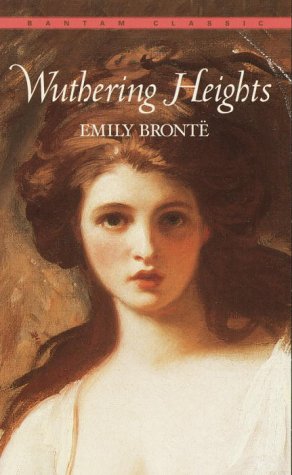
Emily Brontë was an English poet and novelist best known today for her bleak
Gothic novel Wuthering Heights, a book of amorous (perhaps even amoral)
passion. She lived a secluded life with her sisters, in which they created joint
fantasy worlds such as the one they called Gondal. Posing as the Bell brothers,
Emily and her sisters Anne and Charlotte published a book of poems together.
Emily Brontë died at age 30, perhaps from being poisoned by foul runoff from a
nearby church graveyard. In the picture below, Anne, Emily and Charlotte Brontë
have been painted by their brother Branwell.
Elinor Wylie
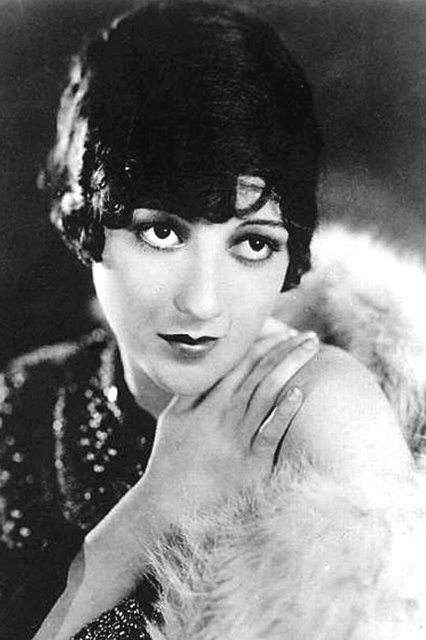
Elinor Wylie "was famous during her life almost as much for her ethereal beauty
and personality as for her melodious, sensuous poetry."
Cold-Blooded Creatures
by Elinor Wylie
Man, the egregious egoist
(In mystery the twig is bent)
Imagines, by some mental twist,
That he alone is sentient
Of the intolerable load
That on all living creatures lies,
Nor stoops to pity in the toad
The speechless sorrow of his eyes.
He asks no questions of the snake,
Nor plumbs the phosphorescent gloom
Where lidless fishes, broad awake,
Swim staring at a nightmare doom.
Emily Dickinson
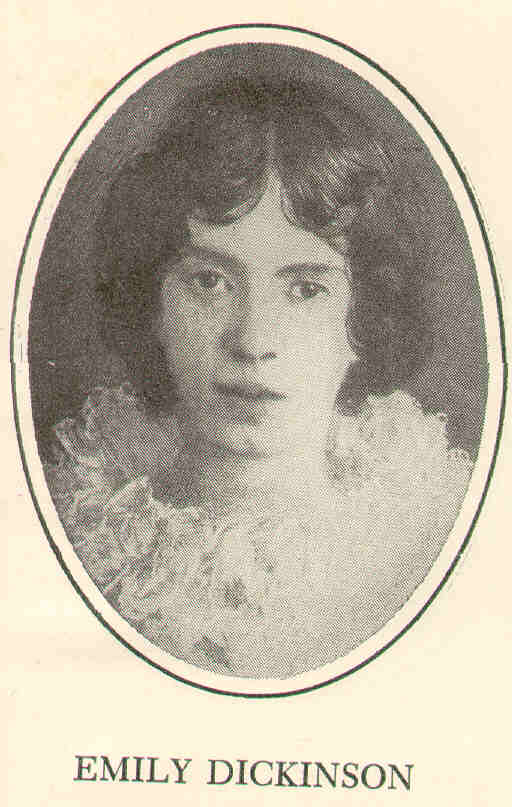
Come slowly, Eden
by Emily Dickinson
Come slowly, Eden
Lips unused to thee.
Bashful, sip thy jasmines,
As the fainting bee,
Reaching late his flower,
Round her chamber hums,
Counts his nectars—alights,
And is lost in balms!
Anne Reeve Aldrich: American Sappho
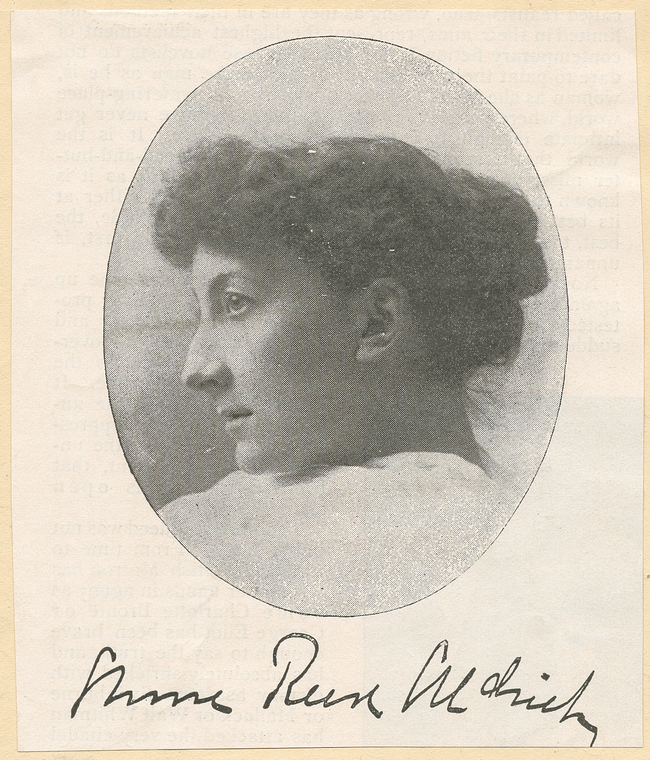
Anne Reeve Aldrich [1866-1892] was an American poet and novelist. She wrote a number of poems in which she seemed to prophesy an early death,
then died at the tender age of 26. She published her first volume of poetry, The Rose of Flame in 1889; it was not well received
(critics cited its "unrestrained expression"). She was also accused of having written “erotic” poems.
Servitude
by Anne Reeve Aldrich
The church was dim at vespers.
My eyes were on the Rood.
But yet I felt thee near me,
In every drop of blood.
In helpless, trembling bondage
My soul's weight lies on thee,
O call me not at dead of night,
Lest I should come to thee!
Other Notorious Poets of Note
William Blake advocated free love, railed against orthodox Christianity, and
called Jehovah "Nobodaddy."
Robert Burns fathered children by different women, wrote drinking songs and
claimed that commoners were as good as kings.
Charles Baudelaire wrote The Flowers of Evil, and has been accused of
Satanism, decadence, etc.
Samuel Taylor Coleridge was an opium addict who consumed up to two quarts
of laudanum per week; his famous poem "Kubla Khan" was written in an opium
dream.
Hart Crane was gay and a heavy drinker; he leaped to
his death from a ship after propositioning a male sailor and being rejected.
e. e. cummings wrote erotic poetry and railed against war and jingoism, but
despite his radical/bohemian image, he supported Joseph McCarthy!
Alan Ginsberg was gay and wrote poems about using
drugs, masturbation, etc.
Abraham Lincoln wrote a ribald poem about a homosexual marriage that was said to
have been more popular than the Bible in parts of Illinois.
Langston Hughes was a radical socialist in the
1930s; possibly gay, he championed black art and condemned white racism.
Christopher Marlowe was accused of being a spy,
counterfeiter, brawler and heretic; he was assassinated shortly after being
accused of blasphemy.
Michelangelo wrote homoerotic poems to a young man, the first such poems to be
written in a modern language.
Edgar Allan Poe was court-martialed from West
Point for refusing to attend classes and church.
Sir Walter Raleigh was a soldier, courtier,
adventurer and spy. He was sent to the Tower of London for seducing and secretly
marrying one of Queen Elizabeth's ladies in waiting. He was later beheaded for
treason on what seem to have been trumped-up charges.
Rainer Maria Rilke had a highly unconventional life for his day. When he was
young his mother, who had lost a daughter, dressed him in girl's clothing. He
later had a relationship with an older married woman. He did not believe in the
divinity of Christ and wrote a poem about Mary Magdalene bearing him a son.
Algernon Charles Swinburne an alcoholic and sexual masochist who wrote about his
fetishes, although no less an expert than Oscar Wilde claimed that he
exaggerated.
Walt Whitman was the father of American free verse.
He wrote overtly sexual homoerotic poems that were beyond radical for their
time.
Meetings of the Notorious Poets
On January 18, 1882 Oscar Wilde visited Walt Whitman in Camden, where the older
poet was living with his brother and sister-in-law. Wilde told Whitman that his
mother had read Leaves of Grass to him as a boy, and that later at
Oxford he and his friends had carried the book to read on their walks.
Flattered, Whitman offered Wilde, whom he later described as "a fine large
handsome youngster," some of his sister-in-law's homemade elderberry wine, and
they conversed for two hours. Asked later by a friend how he had managed to get
the elderberry wine down, Wilde replied: "If it had been vinegar I would have
drunk it all the same, for I have an admiration for that man which I can hardly
express." In a letter to Whitman postmarked March 1, 1882, Wilde wrote: "Before
I leave America I must see you again. There is no one in this wide great world
of America whom I love and honour so much." Wilde was true to his word, making a
second visit to Whitman the following May.
Other Notorious Atheists and Agnostics
Javier Bardem (actor), James Cameron (director), Richard Dawkins (biologist),
Daniel Dennett (philosopher), Brian Eno (musician/composer), Arian Foster (NFL),
Jodie Foster (actress), Ricky Gervais (actor/comedian), Paul Giamatti (actor),
Kathy Griffin (comedian), Sam Harris (scientist), Christopher Hitchens (author),
Penn Jillette (comedian), Billy Joel (singer/songwriter), Keira Knightley
(actress), Hugh Laurie (actor), Seth McFarlane (cartoonist), Sir Ian McKellen
(the actor who played Gandalf in The Lord of the Rings), Julianne Moore
(actress), Daniel Radcliffe (the actor who played Harry Potter), Andy Rooney (of
60 Minutes fame), Emma Thompson (actress)
Related pages:
Famous Geniuses,
Famous Beauties,
Famous Historical Beauties,
Famous Courtesans,
Famous Ingénues,
Famous Hustlers,
Famous Pool Sharks,
Famous Rogues,
Famous Heretics,
Famous Hypocrites,
Famous Forgers,
Famous Frauds,
Famous Flops,
Famous Morons,
The Dumbest Things Ever Said,
Famous Last Words,
Famous Insults,
Famous Hoaxes and Hucksters,
England's Greatest Artists
The HyperTexts




























